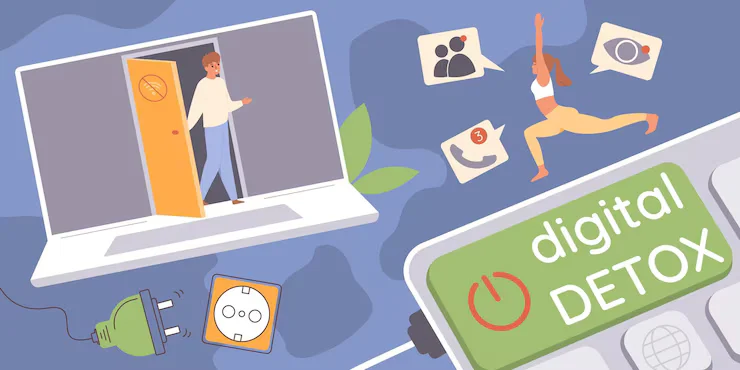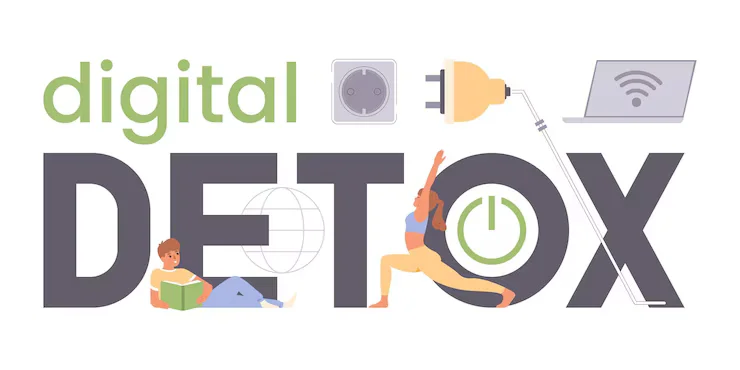-
129, Block-A Bangur Avenue, Mousumi Appartment, Kolkata 700055
129, Block-A Bangur Avenue, Mousumi Appartment, Kolkata 700055

Digital Detox Therapy offers relief from tech-induced stress and burnout. Learn how structured screen breaks—when guided by a reputed counselor—support better mental and emotional health.
In a world where we wake up to phone notifications and fall asleep to screen glow, the lines between life and technology are more blurred than ever. While digital tools have brought convenience and connection, they’ve also introduced new levels of mental strain—stress, anxiety, distraction, and burnout.
That’s where Digital Detox Therapy comes in.
This modern psychological approach isn’t about giving up technology forever. It’s about restoring balance, protecting your cognitive health, and reconnecting with life offline, mindfully, and purposefully.

Let’s explore what digital detox therapy really means, who can benefit from it, and how expert psychological guidance can make the difference.
Digital Detox Therapy is a structured psychological intervention that encourages individuals to take intentional breaks from screens—be it smartphones, laptops, social media, or streaming platforms. It’s not just a weekend off the grid. It’s a therapeutic process designed to:
It’s often recommended or guided by experienced professionals, especially when digital habits start affecting mental, emotional, or social well-being.
According to multiple studies, the average person spends 7+ hours per day on screens. That number spikes among remote workers, students, and social media users. The result? A rise in:
Digital Detox Therapy doesn’t treat screen time as “bad,” but as something to be managed with intention, especially in a culture that values 24/7 availability and performance.
In therapy, a digital detox is more than just switching your phone off. It involves structured interventions tailored to a person’s lifestyle, emotional needs, and tech dependence.
A certified psychological counselor typically begins by:
Over time, individuals regain control over their tech consumption—without feeling deprived or cut off from the digital world.
This therapy isn’t just for those glued to TikTok or gaming consoles. The need is more widespread and subtle than most people realize.
You may benefit from digital detox therapy if you:
It’s especially helpful for:
If any of these resonate, a consult with a reputed psychological expert may reveal the deeper need for a structured digital detox.

This type of therapy, when guided by a professional, can bring about profound cognitive and emotional shifts.
By giving your mind space to breathe, you’re also allowing it to process emotions better—something often buried under notification fatigue and online noise.
Incorporating healthy offline habits can strengthen the effects of digital detox therapy. These small shifts reinforce balance, even outside therapy sessions.
Remember, the goal is not perfection but intentionality. Even small wins matter.
While self-managed detox efforts (like turning off notifications or deleting apps) can help, deeper emotional patterns often need expert guidance. If you’re feeling mentally fatigued, emotionally reactive, or socially withdrawn due to tech overload, it’s time to consider therapy.
Therapists who specialize in behavioral psychology and screen-related stress can help you explore the ‘why’ behind your habits and co-create a personalized plan for healthier digital boundaries.

Q1: Is digital detox therapy only for tech addicts?
Not at all. It’s designed for anyone who feels mentally or emotionally impacted by excessive screen time, even subtly.
Q2: Will I need to completely give up social media?
No. The focus is on balance—not elimination. Therapy helps set realistic and flexible boundaries.
Q3: Can this therapy help my teenager too?
Yes. Teens often benefit greatly, especially when facing social pressure, anxiety, or school-related burnout.
Q4: How long does a digital detox last?
It varies. Some clients begin with a 1-week plan; others explore ongoing screen boundaries over months.
Q5: Is digital detox part of regular mental health therapy?
Increasingly, yes. Many psychological counselors now integrate it as part of holistic wellness care.
In a hyper-connected world, stillness is revolutionary. If your mind is constantly racing, if rest feels unreachable, or if life seems more digital than human, Digital Detox Therapy might be your starting point for real change.
You don’t have to navigate it alone. With guidance from skilled psychological counselors who understand the emotional undercurrent of tech use, you can reshape your relationship with screens—on your own terms.
Mental wellness today is not just about coping. It’s about conscious living.
And sometimes, that begins with simply logging out—just for a while.